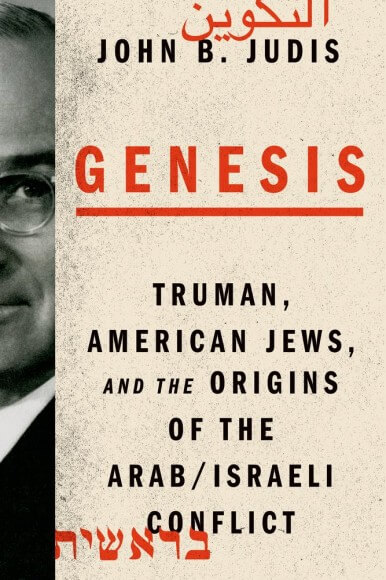
The book has been boosted in some unlikely places (as well as a likely one, us). The New Republic ran a startling excerpt from the book. The Jewish Journal of LA has run a review that seems eminently fair; the author is a Zionist who rationalizes Israel’s actions, but who fairly represents Judis’s criticism of Zionism (more below).
But the book is also now being attacked, by the leading defender of the Israel lobby.
A very insightful review of John Judis’s new book on Israel: http://t.co/oiUXcZuNgm
— Jeffrey Goldberg (@JeffreyGoldberg) February 12, 2014
Goldberg refers to a savage review of the book in The Wall Street Journal by Jordan Chandler Hirsch, a Yale law student. Hirsch characterizes Judis’s book as a malicious screed against Zionism:
Mr. Judis is consumed by what he views as the pernicious influence of diaspora Jewish Zionists on the British and American governments…
The author traces the sinister sway of Zionism to the drafting of the Balfour Declaration…
Hirsch even seems to suggest that Judis believes that Jews are Christ-killers. How do you read this closing?
Zionism, for Mr. Judis, is a kind of sin against liberalism. Near the end, he quotes a saying of Jesus: “For what shall it profit a man, if he shall gain the whole world, and lose his own soul?” and castigates Israel’s Jews for having “gained a world of their own, but at the expense of another people.” An author who brandishes his liberal commitments at every turn ends up invoking a Christian teaching on greed to condemn the Jews for sacrificing another people at the altar of their own interest.
This reading of the book is absurd because Judis is such a sober fellow. I’m reading the book and yes, it has a moral character, but Judis’s manner is not at all what Hirsch conveys. He states at the outset that his research led him to identify with Reform Jews of the 19th century. “I can’t claim to be fulfilling the role of ethical prophet, but what I took from this Reform tradition was the idea that an American Jew should be as concerned about the rights of a Palestinian Arab as he is about the rights of an Israeli Jew.”
His rendering of events is careful and scholarly. He compresses historical incident into very clear storytelling for a contemporary reader; and while his point of view is evident throughout (unrelenting in noting Zionism’s contempt for Palestinians) Judis takes care to praise Zionism as an idealistic response to European conditions. And Ahad Ha’am comes off as noble.
Hirsch misrepresents Judis: “In accusing Zionists of colonial aggression, a new history equates Europe’s mightiest powers with its greatest victims, the Jews.”
Judis is much more nuanced. For Arabs, Zionism was a “nightmare,” continuous with the Crusades and other western efforts to deny them self-determination.
Defenders of a Jewish state would later deride this perception as if it had no validity–to their mind, Jews were a stateless people, free of complicity with Western imperialism, who, in the face of persecution, were seeking to reclaim their ancient home–but the perception of Western conquest was firmly rooted in the role that Britain, eager to preserve [its] empire, would play.
Very clear. Here’s another piece of tendentious argument from Hirsch:
A running theme is that had these Jews been patriotic Britons, they wouldn’t have lobbied for Zionism. Mr. Judis uncritically cites Prime Minister H.H. Asquith receiving a pro-Zionist memo from Herbert Samuel, a Jewish cabinet member, and noting in a private letter that “it is a curious illustration . . . that ‘race is everything’ to find this almost lyrical outburst proceeding from the well-ordered and methodical brain of [Samuel].” Mr. Judis thus deploys the bigotry of yesteryear to bolster his contemporary arguments.
But Judis is much more balanced than Hirsch suggests. He summarizes Herbert Samuel’s devotion in this manner: “Zionism became–as it did for a contemporary, the American Louis Brandeis–the expression of his commitment to Judaism.”
And if you read the full quote from Asquith, it’s clear that Hirsch is misrepresenting the book:
Asquith noted that ‘it is a curious illustration of Dizzy’s [Disraeli’s] favorite maxim that ‘race is everything’ to find this almost lyrical outburst proceeding from the well-ordered and methodical brain of [H.S.]”
Where’s Judis’s bigotry? He’s passing along a historic morsel, maybe anti-Semitic, but fascinating– for it came from Benjamin Disraeli, who was raised an Anglican after his family left Judaism.
Here’s the ending of Jonathan Kirsch’s much fairer review, in the Jewish Journal.
the flaw in Judis’s book, I fear, is the disconnect between ethical idealism and the real world. Jewish values of social justice, which Judis ardently embraces, arguably helped to preserve our survival over two millennia of powerlessness in the Diaspora, but they were not enough to spare us from the Nazis and their collaborators, and it is an open question how they will figure in the future of the embattled Middle East.
Let’s have this argument and bring in young, idealistic privileged Jews!


Hirsch use of ellipsis to resect Disraeli out of the quotation (in order to make Judis sound anti-semitic) is a quite a tell. I mean, it’s not like it shortens the sentence. It just alters its sense.
I fail to see how even the truncated quote is supposed to sound anti-Semitic. Is criticizing someone else for racially-based thinking a bad thing? Asquith seems to be bemused that a fine intellect would become so racially driven.
Well, what should happen when a liberal-minded, or even a reasonably fair-minded, person, confronts the proposition that ‘the Jews have sacrificed another people on the altar of their own interest’? First of all (s)he should reject it as it stands, because it attributes agency to ‘the Jews’ who are not a corporation or an identifiable moral agent. ‘Another people’ conveys something of the same corporatism, so ‘many other people’ or some such wording would do better. But I think that this corporatist way of words comes from Hirsch, not Judis himself.
Hirsch is at liberty to deny the amended proposition ‘Some Jews have (ie in the course of realising Zionist principles) sacrificed many other (ie Palestinian) people’. But he doesn’t immediately deny it, or say that it’s false, but instead suggests that there is some inconsistency in saying that it’s true, and implicitly denouncing the Jewish people in question, on the basis of liberalism. But it’s quite obvious that a liberal or fair-minded person could do nothing, if convinced that this behaviour had occurred, other than denounce the perpetrators. There are other ways to convey the denunciation than using Christian terminology but that terminology is not particularly inappropriate. Hirsch seems to think that he can avoid the substance of Judis’ claims by attacking their logic but it’s rather obvious that he can’t.
“I can’t claim to be fulfilling the role of ethical prophet, but what I took from this Reform tradition was the idea that an American Jew should be as concerned about the rights of a Palestinian Arab as he is about the rights of an Israeli Jew.”
And that, in a nutshell, illustrates the difference between the Judaism that values ethical understanding and equality for all vs. The Judaism practiced as a fundamentalist, fascist ethnocracy.
RE: “Judis’s scholarly book on Truman’s decision gets the Jeffrey Goldberg treatment“ ~ Weiss
MY COMMENT: Actually, I see this as a bit of the “Goldstone treatment” being administered to John Judis by Jordan Chandler Hirsch and Jeffrey Goldberg.